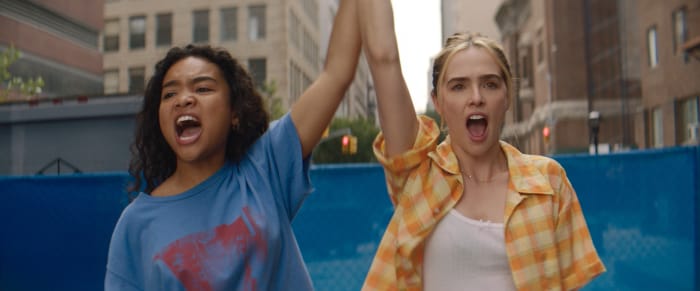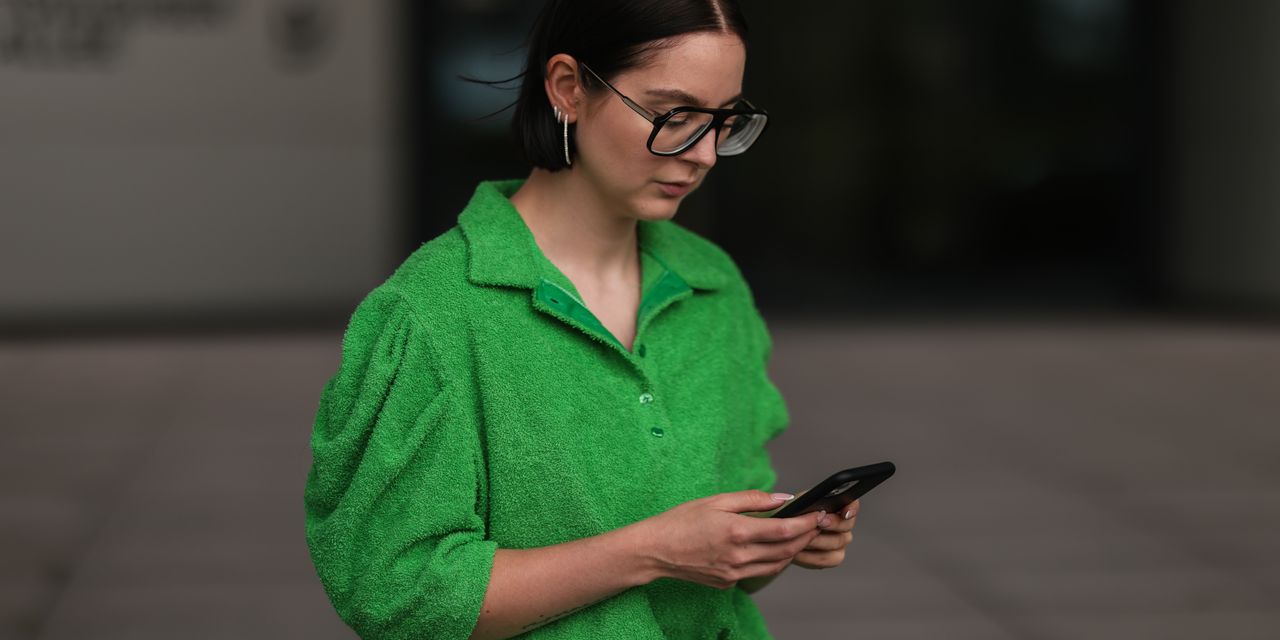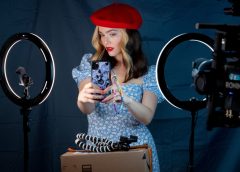
The Latest Challenge in Costume Design: Reimagining Influencer Fashion
[ad_1]
The aspirational influencer narrative creates a captivating and timely allegory — if not cautionary tale — for a film or television protagonist on a quest of self-discovery and recognition. Of course, what these characters wear is essential to their (disseminated-through-the-internet) journeys, as they seek validation from society at large, their peers and perhaps their harshest critics: themselves.
At the surface, Instagram-worthy outfits and clout-chasing designer labels worn by our favorite on-screen characters — like in “Emily in Paris,” costume designed by Patricia Field and Marylin Fitoussi — create a riveting fashion fantasy. The eye candy keeps us clicking into the next episodes, and has been proven to inspire our wardrobes. But these outfits are also sending a message.
As she finds professional success, Chicago-transplant Emily (Lily Collins) evolves from wearing corny Eiffel Tower prints in the pilot to confident, Old Hollywood-referential ensembles on a dream jaunt to Saint Tropez in season two. (Healthy romantic relationships? Still working on it.) Music industry scion Julien Calloway (Jordan Alexander) uses her social media dominance — and access to ripped-from-the-runway Christopher John Rogers — to assert her superiority over younger half-sister Zoya (Whitney Peak) in “Gossip Girl” 2.0, thanks to returning costume designer Eric Daman. In a soapier-than-real-life take on the Anna Delvey scandal, Julia Garner’s titular character in “Inventing Anna” tips hundred-dollar bills and cycles through a montage of high-end designer clothing and handbags at the height of her grift. (Credit to costume designer Lyn Paolo for also using fashion to help illustrate greater society’s predilection to glom onto — and readily cast off — the latest shiny new thing with lots of Instagram followers, too.)
“Have you ever wanted to be noticed so badly, you didn’t even care what it was for?” asks wannabe writer Danni Sanders (Zoey Deutch) at the start of the Gen-Z social-media satire “Not Okay,” which comes out Friday.
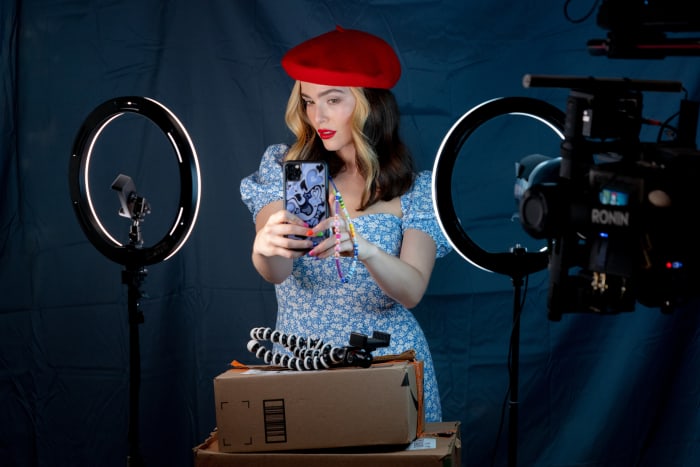
Danni (Zoey Deutch), in a Reformation dress, fakes a trip to Paris.
Photo: Amber Asaly/Courtesy of Searchlight Pictures
Adrift in life and sartorial self-expression, Danni toils as a photo editor at Depravitywhile crushing on the Vice-like outlet’s resident weed-fluencer, Colin (a bleached-blond Dylan O’Brien). Editor Susan (Negin Farsad) regularly rejects Danni’s tone-deaf pitches, like “Why Am I So Sad?” (She feels left out of the generational trauma of 9/11 because she was on vacation with her affluent parents.) Using her Photoshop skills, Danni Instagram-fakes a trip to Paris with flat-lays of Bushwick-procured croissants, a very on-the-nose red beret and a blue floral Reformation dress (above).
“She basically has no style, other than ‘messy,'” says “Not Okay” Costume Designer Sarah Laux (who influenced my own wardrobe with Zoë Kravitz’s square-toe boots and vintage leather jackets in Hulu’s tragically-canceled “High Fidelity”).
Danni — whose closet is full of disposable fast fashion, like a Shein argyle sweater, flares from Urban Outfitters and Steve Madden platform slides — would probably consider Reformation the epitome of “French Girl Style.”
“Danni doesn’t know fashion history. She doesn’t necessarily even have good taste. She’s just a consumer,” says Laux. “She just takes and takes and takes and then sheds it.”
“Not Okay” isn’t the only new on-screen influencer depiction. After being relegated to obscurity for all of high school (in part because that might release the teen from purgatory), senior Erika Vu (Lana Condor) and best friend Gia (Zoe Colletti) decide to live life to the fullest in Netflix series “Boo, Bitch.” As Erika’s popularity at school and online grows, she begins to emulate the click-worthy style — and self-absorbed behavior — of homecoming queen and established influencer Riley (Aparna Brielle).
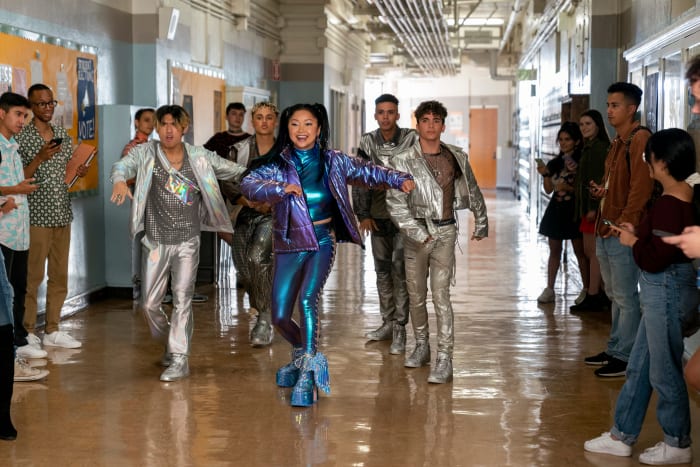
Erika Vu (Lana Condor), in getting her views and likes in ‘Boo, Bitch.’
Photo: Erik Voake/Courtesy of Netflix
Costume Designer Lindy McMichael describes Erika’s flashy feathers, flame pants from Fashion Nova and head-to-toe metallic blue ensemble by Club Exx (above) for a school-hallway TikTok dance as “an over-styled explosion.” Like Laux, she took a deep dive into very-Y2K-referential Zoomer influencers and studied imagery from contemporary label Dolls Kill and early-2000s Delia’s catalogs.
“Erika goes to town on all of the imagery that she has always admired and seen on influencers on Instagram and TikTok. She mixes it all together and has a heyday with it,” says McMichael. “It plays into her making these extremely stylized decisions because she’s gonna do everything that she never did — zero apologies.”
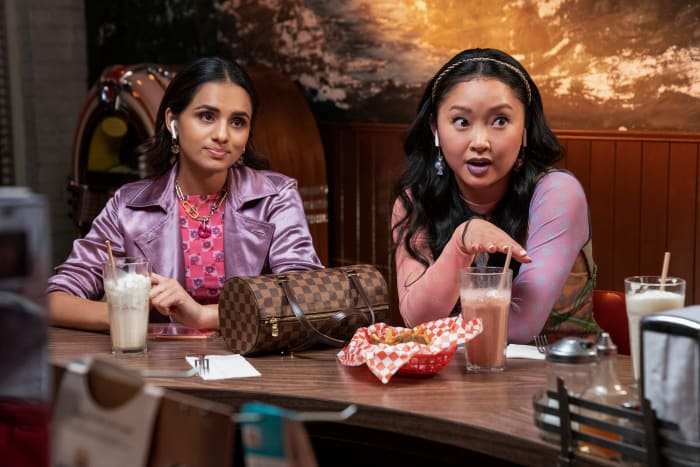
Homecoming queen Riley (Aparna Brielle) and Erika, with her LV bag, twinning.
Photo: Erik Voake/Courtesy of Netflix
As their followings grow, Erika and Danni notably begin carrying a designer bag everywhere. McMichael found Erika’s circa-2010s Louis Vuitton Demier duffle (above) on The RealReal. “Society loves the status symbol,” says McMichael. “As Erika’s power and feeling of invincibility grows, [she carries] these bossy signs of power, like a status symbol.”
Behind the scenes, Danni’s influencer-beloved Prada Re-Edition 2005 Re-Nylon bag (below) was actually procured through star Deutch’s relationship with the luxury label. But Laux imagined that Danni’s parents gave it to her for the holidays, and that she carries the “prized possession” everywhere as “that piece of courage.” The $1,850 handbag, in a delicate and easy-to-stain soft gray, illustrates Danni’s flawed decision-making instincts: “She’s got a thing that could be an investment piece, and she’s chosen the wrong color.”
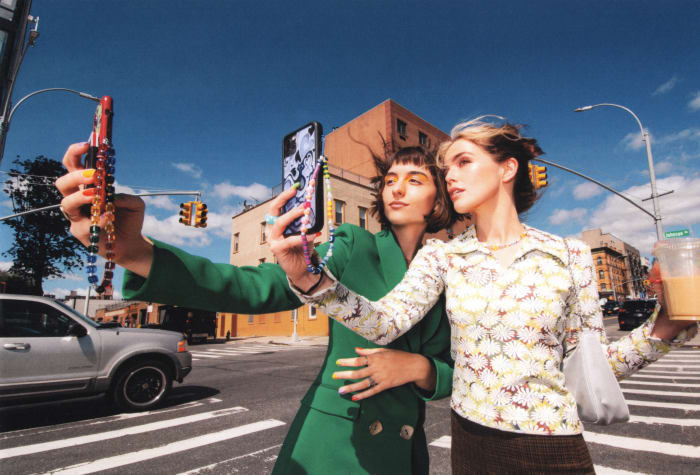
‘Not Okay’ director Quinn Shepherd with Deutch in costume, carrying the Prada bag.
Photo: Amber Asaly/Courtesy of Searchlight Pictures
Both Erika’s and Danni’s ascension to Internet fame is also represented through the preeminent influencer perk: swag. Erika treats her new followers to unboxing videos, while schooling her disappointed and confused parents on the definition of “gifting.” (In a moment of Netflix synergy, Erika could have directed her parents to last year’s “He’s All That,” in which Addison Rae’s Padgett Sawyer sports a spon-con wardrobe, as written into the script; the real-life TikTok sensation actually helped stock the wardrobe with her own brand relationships.) As Colin’s plus-one to an influencer party, Danni discovers the joy of gift bags, while exhibiting her penchant for cultural appropriation with a revealing take on a Chinese qipao by Kim Shui (below) and knee-high boots by Paris Texas. (For AAVE-pilfering Colin, Laux looked to the likes of Eminem, Pete Davidson and Machine Gun Kelly to inform his Balenciaga T-shirt, Saint Laurent sneakers and Basquiat pants.)
“That moment is maximum cringe, like it’s cheugy to the nth degree,” says Laux, who also experienced her own online “blowback” for the dress, which some took as culturally disrespectful. “I did it on purpose. It’s just so wrong, all over the place — yet Danni’s like, ‘This is the thing.'”
Scroll to Continue
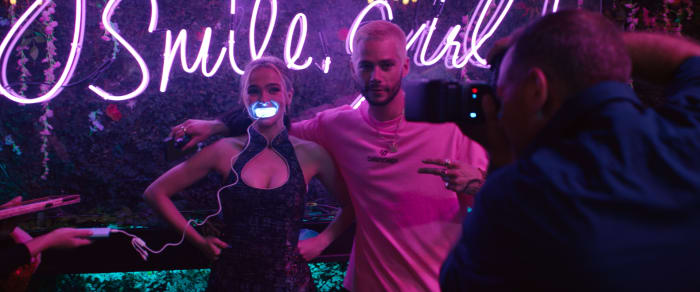
Danni, in her qipao dress, samples some swag at an influencer party with Colin (Dylan O’Brien), wearing a Balenciaga T-shirt.
Photo: Courtesy of Searchlight Pictures
Danni’s entitlement and white privilege peak when she joins a trauma support group, with the intention of co-opting authentic experiences to write a personal essay about her fake Paris trip. She immediately latches onto school shooting survivor Rowan (Mia Isaac), who legitimately amassed a social media following through her activism. And as Danni’s fraudulent Depravity story and accompanying hashtag — #IAmNotOkay — go viral, she steals Rowan’s self-assured, retro-skater plaid shirts and baby tee aesthetic.
“Once she meets Rowan, she really starts to understand what she can capitalize on,” says Laux.
“The Good Wife” and “The Good Fight” co-creators Michelle and Robert King are no strangers to satirizing socio-political issues through their inventive storytelling. In their supernatural thriller series “Evil,” beauty vlogger Malindaz (Taylor Louderman, below) becomes an ideal vessel to depict the, erm, evils of our tech-addicted society. Instead of buying followers, Malindaz literally makes a deal with the devil to boost her numbers: In season two, she imparts damaging body-image messages like, “What to do in a Thunder Thigh emergency.” By the third, she’s shilling crypto.
“The influencers — in our world, at least — do what they do for self-interests and self-success, and to make money and to get what they want,” says Dan Lawson, the Kings’ go-to costume designer. “There’s not a lot of substance behind the visual.”
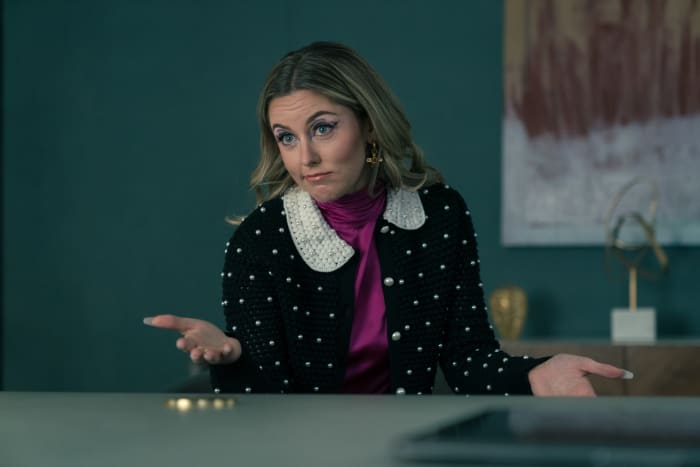
Malindaz, ready to sell you crypto on season three of ‘Evil.’
Photo: Elizabeth Fisher/Courtesy of Paramount+
Lawson emphasizes that he didn’t look to any social-media personalities for Malindaz’s very specific, “over-the-top” and “ultra-put-together” look, which features a mix of bold colors, textures and shapes — especially at the neckline. He wanted to create a unique, eye-catching look that would compel an always-scrolling Instagram, TikTok or VidTap user to immediately stop and look. For Malindaz’s power-summit with (possibly possessed?!) executive Sheryl (Christine Lahti) to discuss crypto spon, her splashy outfit sent another deliberate message.
“Nothing was normal,” says Lawson. “Everything was extra and flouncy and just annoying.”
Like a Shakespearean Five-Act Structure, the archetypical influencer storyline often includes an appropriate falling action stage: being canceled.
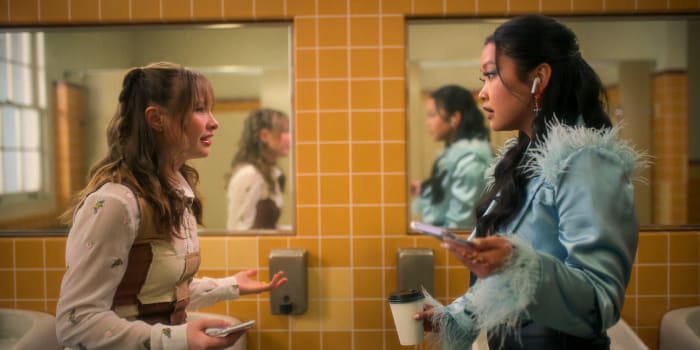
‘As a close friend you should allow me to grow…. my following,’ says Erika, in a Danielle Guizio jacket, to her best friend Gia (Zoe Coletti, left).
Photo: Courtesy of Netflix
As her OTT fashion (and feathers) escalate, Erika’s close relationships with Gia and her supportive parents plummet. Her self-serving efforts to give “a voice to my generation,” as Erika says with zero irony, blow up in her face.
“She’s drinking her own Kool-Aid,” says McMichael. “She’s turning her back on the people who are the most important in her life. But for a moment in time, she’s getting a taste of what she always dreamed of living. She’s doing it, unapologetically, and then realizes that’s not the best path. That’s not her truest self.”
After Danni’s deception is revealed, she faces vicious trolls, her editor, a hurt and betrayed Rowan and the motivations behind her inauthenticity. So, naturally, she attends an “online shaming support group” meeting. “It’s like meta on meta on meta,” says Laux of costume-designing for the attendees, which include the movie’s writer-director Quinn Shephard. In character, she wears a black leather mini-skirt and a “The Future of Film is Female” T-shirt, which she actually donned for a real industry panel (below).
“So we’re supposed to feel bad for you?” the faux Quinn ask Danni, with zero self-awareness. “You say you’ve learned but at the end of the day you’re a privileged white girl who thinks she’s the main character.”
Danni’s immediately admonished by the support group’s leader, played by — in another wink-wink moment — by Caroline Calloway, in her signature flower crown and sweatshirt dress.
“I almost and-costumed it because I went for real. I went for what all of these people really look like,” says Laux, who asked Calloway and Shephard to bring in their own clothes as options.
Like on Instagram and TikTok, fashion in movies and bingeable shows keep the intended messaging on-brand.
“I’m also completely and totally taking the piss at all times,” Laux adds. “Like, I’m actively making fun of this, and, yes, [Danni] does look good.”
Never miss the latest fashion industry news. Sign up for the Fashionista daily newsletter.
[ad_2]
Source link

